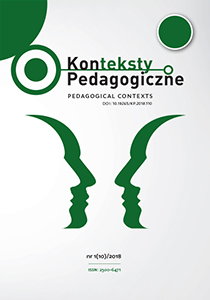Abstract
This article focuses on the modern vision of education – one situated in the perspective of “non-obviousness” – currently giving rise to unclear and frequently contradictory emotions based on curiosity and indignation. What’s the subject and source of this interest? It is this author’s belief that those are ques-tions related to a model of education in a state of transformation – one which constitutes the status quo of a multi-dimensional growth potential of the child. Among significant tasks for education we can name equipping the child with the ability to learn through preparation for independent and conscious employ-ment of diverse possibilities of experiencing the surrounding reality as well as perfecting the acquired (in this process) ability to systemize, verify and evaluate the gained knowledge. This idea is put into practice by the strategy of teaching through the constructivist theory of learning which focuses on the child who dynamically creates his or her own knowledge in the process of exploring and processing information.
References
Cramer, J. (2012). The Portable Thoreau. London: Penguin.
Głoskowska-Sołdatow, M. (2016). Motywacja do uczenia się uczniów w młodszym wieku szkolnym. Warszawa: Wydawnictwo Akademickie „Żak”.
Gołębniak, B.D. (2003). Nauczanie i uczenie się w klasie. W: Z. Kwieciński i B. Śli-werski (red.), Pedagogika. Podręcznik akademicki (s. 170–171). T. 2. Warszawa: PWN.
Klus-Stańska, D. (2014). Dezintegracja tożsamości i wiedzy jako proces i efekt edu-kacji wczesnoszkolnej. W: D. Klus-Stańska (red.), (Anty)edukacja wczesnoszkolna (s. 24–60). Kraków: Oficyna Wydawnicza „Impuls”.
Klus-Stańska, D. (2002). Konstruowanie wiedzy w szkole. Olsztyn: Wydawnictwo Uni-wersytetu Warmińsko-Mazurskiego.
Kozielecki, J. (2001). Psychotransgressjonizm. Nowy kierunek psychologii, Warszawa: Wy-dawnictwo Akademickie „Żak”.
Kruk, J. (2011). W poszukiwaniu źródeł dydaktyki interaktywnej. W: D. Klus-Stań-ska, A. Bronk i A. Malenda (red.), Pedagogika wczesnej edukacji. Dyskursy, problemy, otwarcia (s. 497–506). Warszawa: Wydawnictwo Akademickie „Żak”.
Mietzel, G. (2002). Psychologia kształcenia, przeł. A. Ubertowska. Gdańsk: GWP.
Moss, C.M. i Brookhart, S.M. (2014). Cele uczenia się. Jak pomóc uczniom zrozumieć każdą lekcję, przeł. W. Gasperczyk. Warszawa: MEN.
Murzyn, A. (2013). WokółKena Robinsona kreatywnego myślenia o edukacji. Kraków: Oficyna Wydawnicza „Impuls”.
Prokopiuk, W. (2010). Nauczyciel na polach humanizacji edukacji. Kraków: Oficyna Wydawnicza „Impuls”.
Rutkowiak, J. (2010). Uczenie się w warunkach kultury neoliberalnej: kontestowanie jako wyzwanie dla teorii kształcenia. W: E. Potulicka i J. Rutkowiak (red.), Neo-liberalne uwikłania edukacji (s. 163–176). Kraków: Oficyna Wydawnicza „Impuls”.
Szczepska-Pustkowska, M. (2004). Tropami dziecięcych pytań filozoficznych. W: D. Klus-Stańska (red.), Światy dziecięcych znaczeń (s. 202–232). Warszawa: Wydawnictwo Akademickie „Żak”.
Szempruch, J. (2012). Nauczyciel w warunkach zmiany społecznej i edukacyjnej. Kra-ków: Oficyna Wydawnicza „Impuls”.
Szymański, M.J. (2008). W poszukiwaniu drogi. Szanse i problemy edukacji w Polsce, wyd. II. Kraków: Wydawnictwo Naukowe Akademii Pedagogicznej.
Waloszek, D. (2014). Między przedszkolem a szkołą. Rozważania o gotowości dzieci do podjęcia nauki w szkole. Warszawa: Wydawnictwo Akademickie „Żak”.
Waloszek, D. (2005). Program w edukacji dzieci. Geneza, istota, kryteria. Warszawa: Wydawnictwo Akademickie „Żak”.
Waloszek, D. (2009). Sytuacyjne wspieranie dzieci w doświadczaniu świata. Kraków: Wydawnictwo Naukowe Uniwersytetu Pedagogicznego.
In accordance with the recommendation of the Ministry of Science and Higher Education, which aims to counteract the practice of “ghostwriting” and “guest authorship,” all authors submitting their text for publication should attach an author’s statement which declares the contribution of each of the authors to the article. The printed and signed statement should be delivered by mail or other means to editor-in-chief Joanna Skibska or sent in the form of a scan to the following e-mail address: redakcja@kontekstypedagogczne.pl. The authors will not receive remuneration for publishing their papers. The editors reserve the right to make minor editorial changes to the articles which will not affect the substance of the article. We encourage all authors to prepare their articles in accordance with the guidelines for manuscript preparation. Download pdf file.
Authors transfer all copyrights and grant the journal the right of first publication with the work simultaneously licensed under a Creative Commons Attribution License that allows others to share the work with acknowledgement of the work's authorship and initial publication in this journal. All authors agree to the publishing of their email addresses, affiliations and short bio statements with their articles during the submission process.

